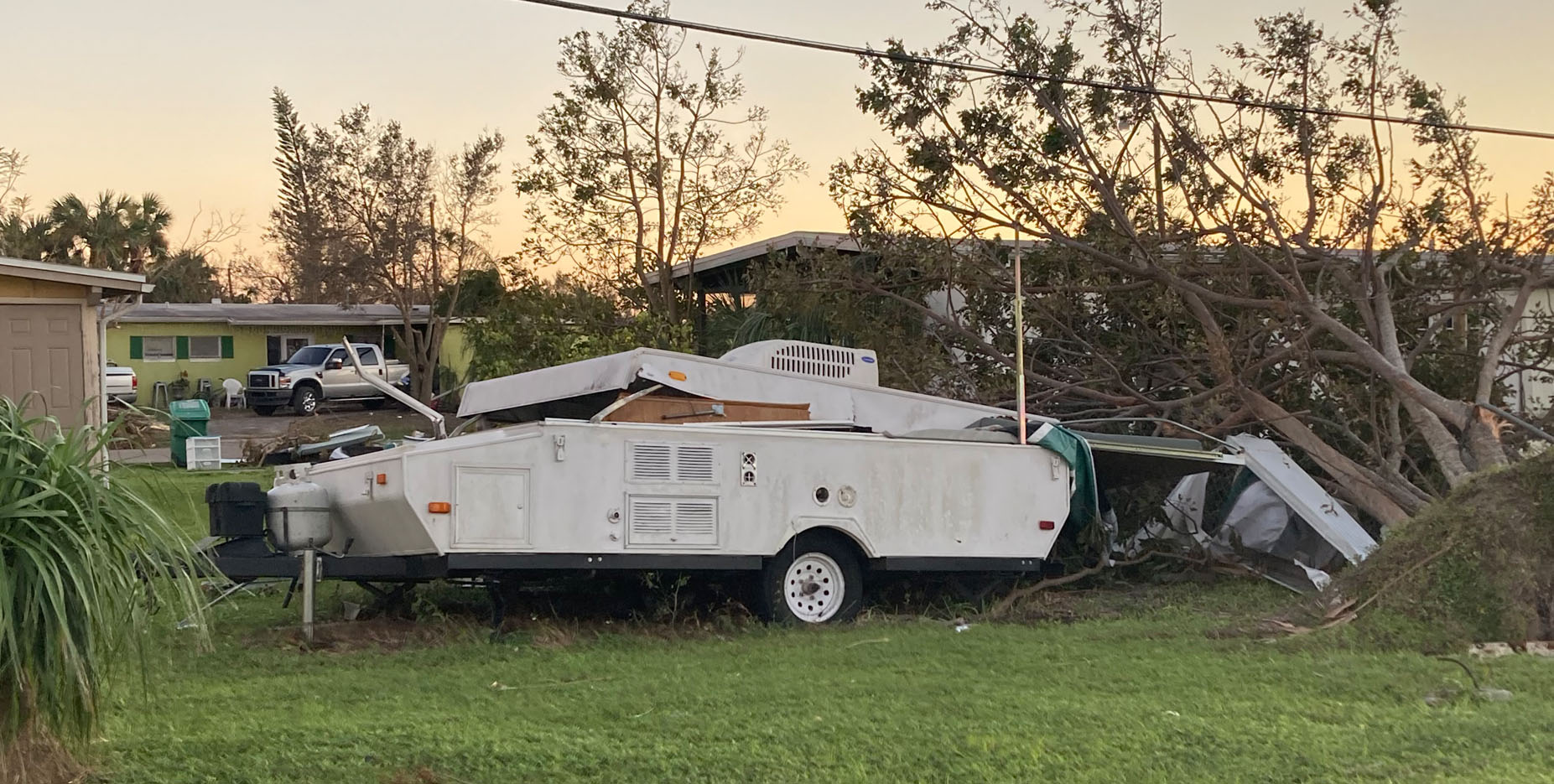
A camper and a tree destroyed in Port Charlotte, Florida following Hurricane Ian. (Credit: PCHS-NJROTC/WikiCommons)
On September 28, Category 4 Hurricane Ian pummelled the south-eastern US state of Florida, leaving the entire island of Cuba without power. Warming waters in the Atlantic Ocean caused the storm to strengthen rapidly. It then moved slowly northeast across the state, leaving a death toll of over 100 people and damage estimated at between $42 and $25 billion.
State officials anticipated the magnitude of the once-in-a-thousand-year storm and issued evacuation orders to 2.5 million Florida residents.
The slow-moving storm brought massive rainfall and devastation, levelling and flooding homes, totalling countless vehicles, and causing millions to lose power.
The crisis has put housing costs at the centre of the conversation, as some question whether to rebuild in such a risky place as climate change makes such disasters more frequent.
Only 17 per cent of affected homeowners had flood insurance due to its high cost, and now many are choosing not to rebuild.
Florida stands at the forefront of the climate crisis. Previous hurricanes have put insurers out of business or forced them to leave the state to offer services in safer housing markets.
Soon, Florida homes may be affordable only for the super-rich, as premiums skyrocket and coastal areas become more prone to sea level rise and stronger hurricanes.
While there is an acknowledgement that climate change has increased the likelihood of storms of high magnitude like Ian, analysing the extent that climate change exacerbates such storms takes a long time.
The striking images of the damage circulating on social media—the broken and partially submerged Sanibel Island Causeway, people boating through neighbourhoods, and flooded luxury cars—have shocked Americans.
Christina Kellagher, a Tampa resident who evacuated to the East Coast for the duration of the hurricane and experienced it as a Category 1, said she saw palm trees blown completely sideways by the high winds.
The hurricane struck Fort Myers, farther south than was expected, and some evacuation orders went out too late for some to flee.
Still, the state’s leadership has been praised for its response to the disaster. Florida’s governor, Ron DeSantis, is a darling of the Republican Party.
His party tends to be less concerned about climate change, and some outright deny the phenomenon. Soon after being elected, DeSantis surprised constituents by appointing a Chief Resilience Officer. He also made $1 billion in funds available for projects to adapt to rising seas.
Florida’s tourism industry is vital to the state’s economy, so it is practical to take measures to adapt to environmental shifts. Such decisions made the governor seem open to practical discussion about climate change mitigation strategies.
However, DeSantis was recently criticized in a New York Times opinion piece for only focusing on temporary fixes through the resilience projects, protecting fossil fuel interests, and approving development in vulnerable areas.
At the same time that Florida is becoming more vulnerable to stronger storms, its population is growing. After Hurricane Maria hit Puerto Rico in 2017, people fled to Florida, increasing housing demand and prices. During the height of the COVID-19 pandemic, city-dwelling Americans flocked to the state, seeking more space and laxer restrictions.
The increase in demand, coupled with the greater risk for insurers, is making Florida’s housing market prohibitively expensive.
Climate change is conceptually understood by the population, but old habits and desires are not catching up with the new reality.
The aspiration to live in a coastal city or one day own a beachfront property is a mentality that does not lend itself to the realistic future that climate change brings. Coastal erosion and widespread flooding are already seen in Florida. Insurance premiums have increased significantly.
The state’s Republican legislature makes it difficult to pass meaningful climate legislation. Business as usual looks like continuing to engage in polluting industries, developing on vulnerable land, and calling on the federal government to fund rebuilding efforts after predictable disasters.
Sarah Sakeena Marshall,
American University’s School of Intl Service, The Muslim News Environmental Columnist